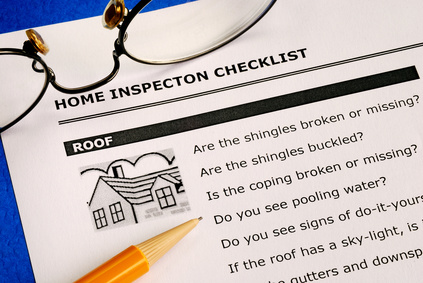It’s been said, “The devil’s in the details.”
This is certainly true when it comes to buying real estate…even unimproved real estate. After all, there’s so much that the naked and untrained eye just can’t see, which is why property inspections are so important.
In this episode, we take a look at some of the myriad of property inspections available to help investors uncover hidden problems, avoid unexpected expenses and gain leverage in negotiations.
- Visit our Special Reports library.
- Don’t miss an episode of The Real Estate Guys™ radio show. Subscribe to the free podcast!
- Stay connected with The Real Estate Guys™ on Facebook!
The Real Estate Guys™ radio show and podcast provides real estate investing news, education, training and resources that help real estate investors succeed.
Inspections are a very important part of real estate investing.
It’s just smart to have a trained expert objectively evaluate the condition of all components of a property so you don’t end up walking blindly into a costly repair or remediation.
In The Real Estate Guys™ radio show studio B unraveling the mystery of property inspections…
- Your ace detective of discussion, Robert “Sherlock” Helms
- His joker sidekick, Russell “Watson-of-a-Gun” Gray
Property inspections is a HUGE topic. And because it’s far too technical and time consuming to do a comprehensive explanation of all of the many inspections available, it’s important to start out with some essential principles.
Property Inspections are Cheap Insurance
Every real estate transaction has a LONG list of various and sundry expenses. In your zeal to reduce expenses and maximize profits, it’s easy to skip an inspection or two.
Bad idea.
You only need to miss ONE major thing…or even a minor one…to see all that “savings” just disappear.
With that said…
Only Get Inspections on What You Plan to Keep
There’s no point to paying for structural inspections on a structure you plan to tear down or a roof you plan to replace. Duh.
Attend the Inspections if You Can
Even though you can and SHOULD read the inspection reports when you receive them, they’ll mean a lot more if you’re actually present when the inspection takes place. This way, you can see things in person and ask questions in real time.
Hire QUALITY Inspectors
 Like any profession, you’ll find dedicated, competent, diligent providers. And you’ll find those who are lazy, incompetent and inexperienced.
Like any profession, you’ll find dedicated, competent, diligent providers. And you’ll find those who are lazy, incompetent and inexperienced.
Take a guess which one’s cheaper. Take another guess about which one costs more. Now guess which ones you should hire.
Duh.
Inspect the Visible and the Invisible
Even novice investors can understand inspecting the roof and physical structure. But don’t forget things like title…and sometimes the soil.
Sometimes there are things lurking underground or behind the walls, which are literally toxic…and VERY expensive to fix.
Sometimes there are easements and restrictions which can affect your plans…and the value.
Use Protection
Using professional representation can be a great way to have another set of experienced eyes looking over everything.
Sometimes investors try to “save” commissions (which are paid by the seller anyway) by representing themselves or using a friend or family member who happens to have a real estate license, but no substantial relevant experience.
We think it’s just smart to use a real estate agent who is experienced in the type of property you are buying. Someone who’s been involved in many similar transactions will often think of things you won’t. And they’ll have a better idea about what kind of concessions are reasonable in a given market when something is discovered which necessitates a renegotiation (“re-trade”).
Order Your Inspections
For newbie investors, a property can seem like a complex creature. In reality, a property is a whole lot less complex than your car or body.
A piece of dirt with a physical structure on it is simply an assembled combination of easy to understand components. The idea of property inspections is simply to discover the actual condition of each of these components.
So think about it from the ground up…
- The dirt – title report, environmental report (usually commercial)
- The infrastructure – sewer, septic
- The structure – foundation, structure (termite), electrical, appliances, HVAC, plumbing, roof
- Structural toxins – lead (paint), asbestos (ceiling, insulation), mold
Remember…Knowledge is Power
An accurate assessment of the property’s condition is essential to putting together a budget for Cap Ex (capital expenditures, i.e., initial fix up) and operating budget (reserves, contingency).
But in cases where defects aren’t known or properly disclosed by the seller and therefore not built into the pricing, your property inspections provide some leverage in renegotiating the deal.
The idea is that the price offered was offered based on what was known about the property. When something major comes up, it’s reasonable to ask for adjustments. It doesn’t mean you’ll get them, but you definitely won’t if you don’t ask.
With that said…
Don’t Major in the Minors
No one buying a “used” property should expect it to be perfect. There will be a certain amount of wear and tear…aka deferred maintenance.
So when you craft your offer, you should already have that built into your price.
And if you find something in your inspections which you didn’t expect, you need to decide if it’s worth potentially blowing the deal up over. That is, you should ask yourself, “If the seller refuses to fix this, then am I willing to walk away?”
If not, then think twice about asking for a concession. ESPECIALLY if the market is red-hot and the seller’s holding back up offers.
Avoid Seller Surprises
 Up to now, we’ve focused on this whole issue from the BUYER’s perspective. But what about the SELLER?
Up to now, we’ve focused on this whole issue from the BUYER’s perspective. But what about the SELLER?
We think it’s smart for a seller to order up most of the major inspections BEFORE putting the property on the market. This way, you know what the buyer is likely to find. And you can price your property accordingly or budget for concessions you’ll need to make in a re-trade (re-negotiation).
Sure, this adds some extra expense. And the buyer’s probably going to want to order their own inspections anyway. So why bother?
First, as noted, this allows you to price your offer and/or adjust your own expectations for net cash. No point making big plans for an amount of net proceeds you’re not going to get.
Also, if the buyer’s inspections show more problems than your inspections, you’ll already have a second opinion.
Plus, having the inspections sets a professional and honest tone for the transaction. It builds trust versus suspicion. This good will is very handy for any back and forth that might occur during the transaction.
Do Ask, Do Tell
Keep in mind that once you know about something “material”, as a seller in virtually all jurisdictions (in the U.S.), you’re required to disclose. Omitting a material fact is akin to misrepresentation.
Now if you’re a sneaky character, you may think it better NOT to know, so you’re under no obligation to disclose. After all, you can only disclose things you know…or where the law deems that you have SHOULD know.
BUT…if the buyer is going to order inspections and find things out, they’ll probably tell you when they start bargaining. So you’re probably going to find out anyway. And then if the first offer falls apart, you’ll have to disclose to every subsequent buyer anyway.
So we think it just makes sense to find out early, correct what makes sense BEFORE you market the property, price your property appropriately for its true condition, then disclose everything.
Ghosts of Transactions Past
 Even if you “get away” with selling a property with a major undisclosed problem, a duped and angry buyer may decide you cheated him…and come back to unwind the transaction or sue for damages. Who needs that?
Even if you “get away” with selling a property with a major undisclosed problem, a duped and angry buyer may decide you cheated him…and come back to unwind the transaction or sue for damages. Who needs that?
Worse, if you’re active in the market, you don’t want to be known as “that” guy…the one who tries to cheat buyers.
It Pays to Be a Pro
We think it’s better to be a pro. So whether buying or selling, be sure you get quality property inspections from qualified providers, and use them to negotiate a deal that is fair to both sides. You may pay a little more or net a little less, but you’ll sleep better at night…and you’ll build a better reputation.
Plus, when word gets out that you’re a straight shooter, market participants may give you preference when it comes to bringing you deals or buying your inventory. And that can be worth a LOT.
Listen Now:
- Visit our Special Reports library.
- Don’t miss an episode of The Real Estate Guys™ radio show. Subscribe to the free podcast!
- Stay connected with The Real Estate Guys™ on Facebook!
The Real Estate Guys™ radio show and podcast provides real estate investing news, education, training and resources that help real estate investors succeed.













